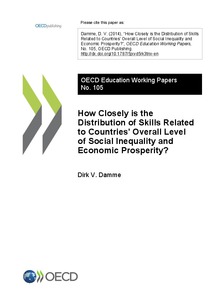How closely is the distribution of skills related to countries' overall level of social inequality and economic prosperity?

Organisation for Economic Co-operation and Development, Paris
OECD Publishing - Paris
2014
23 p.
economic growth ; human capital ; level of qualification ; skill ; social inequality
OECD Education Working Papers
105
Education and training
http://dx.doi.org/10.1787/5jxvd5rk3tnx-en
English
Bibliogr.
"A country's level of human capital – the knowledge and skills in the population – has a strong bearing on its economic potential for growth and prosperity. On the other hand, its level of social inequality might prevent prosperity to be shared in equitable ways across the population. This papers looks at the relationship between the distribution of numeracy skills in the population to measures of economic prosperity (per capita GDP) and social inequality (Gini coefficient). Country-level correlations between various measures of the skills dispersion and these two indicators are presented. The correlations suggest that a higher numeracy skills dispersion is related to higher social inequality. A higher share of low-skilled adults relates positively with greater social inequality, while a higher share of high-skilled adults seems to be related with higher levels of economic output."
Digital
The ETUI is co-funded by the European Union. Views and opinions expressed are however those of the author(s) only and do not necessarily reflect those of the European Union or the ETUI.